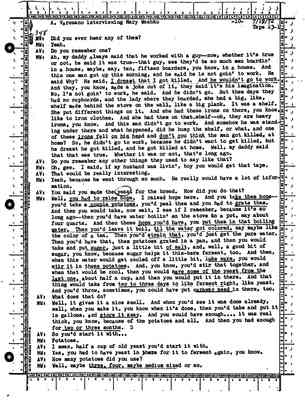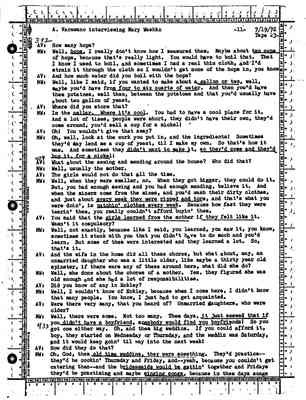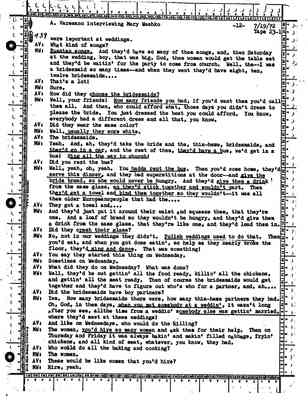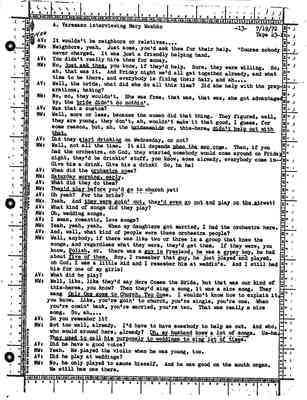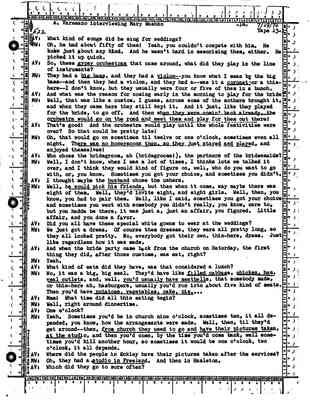Pages
15
A.Varesano interviewing Mary Washko -10- 7/19/72 Tape 23-1 MW: Did you ever hear any of them? MW: Yeah. AV: Do you remember one? MW: Ah, my daddy always said that he worked with a guy--now, whether it's true or no, he said it was true--that guy, see they'd be so much men boardin' in a house, maybe, say, ten, fifteen boarders, you know, in a house. And thhis one man got up this morning, and he said he is not goin' to work. He said Why? He said, I dreamt that I got killed. And he wouldn't go to work. And they, you know, made a joke out of it, they said it's his imagination. No, I'm not goin' to work, he said. And he didn't go. But them days they had no cupboards, and the lady where they boarded, she had a big, like, shelf made behind the stove on the wall, like a big plank. It was a shelf. She put different things on it. And she had these irons on there, you know, like to iron clothes. And she had them on that shelf--oh, they are heavy irons, you know. And this man didn't go to work. And somehow he was standing under there and what happened, did he bump the shelf, or what, and one of these irons fell on his head, and don't you think the man got killed, at home? So he didn't go to work, because he didn't want to get killed, but he dreamt he got killed, and he got killed at home. Well, my daddy said that that was true. Whether it was or not, that's long ago. AV: Do you remember any other things they used to say like that? MW: Oh, gee. I said, if my husband was livin', boy you would get that tape. AV: That would be really interesting. MW: Yeah, because he went through so much. He really would have a lot of information. AV: You said you made the yeast for the bread. How did you do that? MW: Well, you had to raise hops. I raised hops here. And you take them hops--you'd take a couple potatoes, you'd peel them and you had to grate them. And then you would take, now wait, I see if I remember, because it's so long ago--you'd have water boilin' on the stove in a pot, say about four quarts. And then these hops you'd have, you put them in that boiling water. Then you'd leave it boil, til the water got colored, say maybe like the color of a tea. Then you'd strain that, you'd just get the pure wather. Then you'd have that, them potatoes grated in a pan, and them you would take and put sugar, just a little bit of salt, and, well, a good bit of sugar, you know, because sugar helps it this-here ferment, too. And then, when this water would get cooled off a little bit, luke warm, you would stir it in these potatoes. And, you know, you'd stir that together, and when that would be cool, then you would save some of the yeast from the last one, about half a cup, and then you would put it in there. And that thing would take two to three days to like ferment right, like yeast. And you'd throw, sometimes, you could have put caraway seed in there, too. AV: What does that do? MW: Well, it gives it a nice smell. And when you'd see it was done already, well, when you make it, you know when it's done, then you'd take and put it in gallon, and store it away. And you would have enough....it was real thick, you know, because of the potatoes and all. And then you had enough for two or three months. AV: So you'd start it with... MW: Potatoes. AV: I mean, half a cup of old yeast you'd start it with. MW: Yes, you had to have yeast in there for it to ferment again, you know. AV: How many potatotes did you use? MW: Well, maybe three, four, maybe medium sized or so.
16
A. Varesano interviewing Mary Washko -11- 7/19/72 Tape 23AV: How many hops? MW: Well, hops. I really don't know how I measured them. Maybe about two cups of hops, because that's really light. You would have to boil that. That I know I used to boil, and sometimes I had a real thin cloth, and I'd strain it through the cloth so I wouldn't get none of the hops in, you know. AV: And how much water did you boil with the hops? MW: Well, like I said, if you wanted to make about a gallon or two, well, maybe you'd have from four to six quarts of water. And then you'd have them potatoes, well then, between the potatoes and that you'd usually have about two gallon of yeast. AV: Where did you store that? MW: In the cellar. Where it's cool. You had to have a cool place for it. And a lot of times, people were short, they didn't have their own, they'd come around, you'd sell a cup for a nickel! AV: Oh! You wouldn't give that away? MW: Oh, well, look at the work you put in, and the ingredients! Sometimes they'd say lend me a cup of yeast, til I make my own. So that's how it was. And sometimes they didn't want to make it, so they'd come and they'd but it, for a nickel! AV: What about the sewing and mending around the house? Who did that? MW: Well, usually the mother. AV: The girls would not do that all the time. MW: Well, when you were smaller, no. When they got bigger, they could do it. But, you had enough sewing and you had enough mending, believe it. And when the miners come from the mines, and you'd wash their dirty clothes, and just about every week they were ripped and tore, and that's what you were doin', is patchin' clothes every week. Because how fast they were tearin' them, you really couldn't afford buyin' them. AV: You said that the girls learned from the mother if they felt like it. Wasn't it compulsory? MW: Well, not exactly, because like I said, you learned, you saw it, you know, sometimes it stuck with you that you didn't have to do much and you'd learn. But some of them wre interested and they learned a lot. So, that's it. AV: And the wife in the home did all these chores, but what about, say, an unmarried daughter who was a little older, like maybe a thirty year old spinster, if there were any of these around her, what did she do? MW: Well, she done about the chores of a mother. Yes, they figured she was old enough and she had a lot of responsibilities. AV: Did you know of any in Eckley? MW: Well, I wouldn't know of Eckley, because when I come here, I didn't know that many people. You know, I just has to get acquainted. AV: Were there very many, that you heard of? Unmarried daughters, who were older? MW: Well, there were some. Not too many. Them days, it just seemed that if you didn't have a boyfriend, somebody would find you boyfriends! So you got one either way. Oh and them big weddins. If you could afford it, boy, they started on Wednesday or Thursday, and the weddin was Saturday, and it would keep goin' til way into the next week! AV: How did they do that? MW: Oh, God, them old time weddins, they were something. They'd practice--they'd be cookin' Thursday and Friday, and--yeah, because you couldn't get catering then-- and the bridesmaids would be gettin' together and Friday's they'd be practising and maybe singing songs, because in them days songs
17
A. Varesano interviewing Mary Washko -12- 7/19/72 Tape 23-1 were important at weddings. AV: What kind of songs? MW: Russian songs. And they'd have so many of them songs, and, then Saturday at the wedding, boy, that was big. God, them women would get the table set and they'd be waitin' for the party to come from church. Well, the--I was a bridesmaid so many times--and when they went they'd have eight, ten, twelve bridesmaids.... AV: That's a lot! MW: Sure. AV: How did they choose the bridesmaids? MW: Well, your friends! How many friends you had, if you'd want them you'd call them all. And then, who could afford what, those days you didn't dress to please the bride. You just dressed the besst you could afford. You know, everybody had a different dress and all that, you know. AV: Did they wear the same color? MW: Well, they usually wore white. AV: The bridesmaids. MW: Yeah. And ah, they'd take the bride and this-here, bridesmaids, and they'd go in a car, and the rest of them, they'd have a bus, we'd get in a bus! Sing all the way to church! AV: Did you rent the bus? MW: Well, yeah, oh, yeah. You hadda rent the bus. Then you'd come home, they'd serve this dinner, and they had superstitions at the door--and give the bride bread, so she would never be hungry. And they'd give them a drink from the same glass,, so they'd stick together and wouldn't part. Then they'd get a towel and bind them together so they wouldn't--it was all them older Europeanspeople that had the.... AV: They got a towel and.... MW: And they'd just put it around their waist and squeeze them, that they're one. And a loaf of bread so they wouldn't be hungry, and they'd give them a drink from the same glass, that they're like one, and they'd lead them in. AV: Did they crush their glass? MW: No, not in our weddings they didn't. Polish weddings used to do that. Then you'd eat, and when you got done eatin', so help me they nearly broke the floor, they'd sing and dance. That was something! AV: You said they started this thing on Wednesday. MW: Sometimes on Wednesday. AV: What did they do on Wednesday? What was done? MW: Well, they'd be out gettin' all the food ready, killin' all the chickens, and gettin' all the meat ready. Then of course the bridesmaids would get together and they'd have to figure out who's who for a partner, and, ah.... AV: Did the bridesmaids have boy partners? MW: Yes. How many bridesmaids there wer, how many this-here partners they had. Oh, God, in them days, when you met somebody at a weddin', after you see, allthe time from a weddin' somebody else was gettin' married, where they'd meet at these weddings! AV: And like on Wednesdays, who would do the killing? MW: The women, you'd hire so many women and ask them for their help. Then on Thursday and Friday it was always bakin' and makin' filled cabbage, fryin' chickens, and all kind of mean, whatever, you know, they had. AV: Who would do all the baking and cooking? MW: The women. AV: These would be like women that you'd hire? MW: Hire, yeah.
18
A. Varesano interviewing Mary Washko -13- 7/19/72 Tape 23-1 AV: It wouldn't be neighbors or relatives... MW: Neighbors, yeah. Just some, you'd ask them for their help. 'Course nobody never charged. It was just a friendly helping hand. AV: You didn't really hire them for money. MW: No, just ask them, you know, if they'd help. Sure, they are willing. So, ah, that was it. And Friday night we'd all get together already, and what time to be there, and everybody is fixing their hair, and ah.... AV: Well, the bride, what did she do all this time? Did she help with the preparations, baking? MW: No, no, they wouldn't. She was free, that was, that was, she got advantaged by, the bride didn't do nothin'. AV: Was that a custom? MW: Well, more or less, because the women did that thing. They figured, well, they are young, they don't, ah, wouldn't make it that good, I guess, for some reason, but, ah, the bridesmaids or, this-here, didn't help out with that. AV: Did they start drinking on Wednesday, or not? MW: Well, not all the time. It all depends when the men come. Then, if you had the orchestra, oh God, they started, somebody would come around on Friday night, they'd be drinkin' stuff, you know, some already, everybody come in--Give him a drink, Give him a drink! So, ha ha! AV: When did the orchestra come? MW: Saturday morning, early. AV: What did they do then? MW: They'd play before you'd go to church yet! AV: Oh yeah? For the bride? MW: Yeah. And they were goin' out, they'd even go out and play on the street! AV: What kind of songs did they play? MW: Oh, wedding songs. AV: I mean, romantic, love songs? MW: Yeah, yeah, yeah. When my daughters got married, I had the orchestra here. AV: And, well, what kind of people were these orchestra people? MW: Well, anybody, if there was like two or three in a group that knew the songs and regardless what they were, they'd get them. If they were, you know, Polish, or, there was a guy in Freeland, he was a gypsy boy, he had about five of them. Boy, I remember that guy, he just played and played, oh God, I was a little kid and I remember him at weddin's. And I still had him for one of my girls! AV: What did he play? MW: Well, like, like they'd say Here Comes the Bride, but that was our kind of this-heres, you know? Then they'd sing a song, it was a nice song. They sang Only One goes to Church, Two Come. I wouldn't know how to explain it, you know. Like, you're goin' to church, you're single, you're one. When you're comin' back, you're married, you're two. That was a really nice song. So, ah.... AV: Do you remember it? MW: Not too well, already. I'd have to have somebody to help me out. And who, who would around here, already? Oh, my husband knew a lot of songs. Um-hm. They used to call him purposely to weddings to sing lot of times. AV: Did he have a good voice? MW: Yeah. He played the violin when he was young, too. AV: Did he play at weddings? MW: No, he only played to amuse himself. And he was good on the mouth organ. He still had one there.
19
A. Varesano interviewing Mary Washko -14- 7/19/72 Tape 23-1 AV: What kind of songs did he sing for weddings? MW: Oh, he had about fifty of them! Yeah, you couldn't compete with him. He knew just about any kind. And he wasn't hard in memorizing them, either. He picked it up quick. AV: So, these gypsy orchestras that came around, what did they play in the line of instruments? MW: They had a big bass, and they had a violin--you know what I mean by the big bass--and then they had a violin, and they had a--was it a coronet or a this-here--I don't know, but they usually were four or five of them in a bunch. AV: And what was the reason for coming early in the morning to play for the bride? MW: Well, that was like a custom, I guess, across some of the mothers brought it, and when they came here they still kept it. And it just, like they played for the bride, to go off. And then when they were comin' back already, the orchestra would go on the road and meet them and play for them out there! AV: That's good! And the orchestra would play until the whole festivities were over? So that could be pretty late! MW: Oh, that would go ono sometimes til twelve or one o'clock, sometimes even all night. There was no honeymoons then, so they just stayed and played, and enjoyed themselves! AV: Who chose the bridegroom, ah (bridegrooms!), the partners of the bridesmaids? MW: Well, I don't know, when I was a lot of times, I thinks lots we talked it over, and I think they would kind of figure on, well, who do you want to go with, or you know. Sometimes you got your choice, and sometimes you didn't. AV: I thought maybe the husband chose the ushers. MW: Well, he would pick his friends, but then when it come, say maybe there was eight of them. Well, they'd invite eight and eight girls. Well, then, you know, you had to pair them. Well, like I said, sometimes you got your choice and sometimes you went with somebody you didn't really, you know, care to, but you hadda be there, it was just a, just an affair, you figured. Little affair and you done a favor. AV: Did you all have these special white gowns to wear at the weddings? MW: We just got a dress. Of course them dresses, they were all pretty long, so they all looked pretty. No, everybody got their own, this-here, dress. Just like regardless how it was made. AV: And when the bride party came back from the church on Saturday, the first thing they did, after those customs, was eat, right? MW: Yeah. AV: What kind of eats did they have, was that considered a lunch? MW: No, it was a big, big meal. They'd have like filled cabbage, chicken, ham, veal cutlets, and well, you'd usually have meatballs, that somebody made, or this-here ah, hamburgers, usually you'd run into about five kind of meats. Then you'd have potatoes, vegetables, cake, pie.... AV: Mmm! What time did all this eating begin? MW: Well, right around dinnertime. AV: One o'clock? MW: Yeah. Sometimes, you'd be in church nine o'clock, sometimes ten, it all depended, you know, how the arrangements were made. Well, then, they'd get around--then, from church they used to go and have their pictures taken, at the studio, and then you'd come, by the time you'd come back, well sometimes you'd kill another hour, so sometimes it would be one o'click, two o'clock, it all depends. AV: Where did the people in Eckley have their pictures taken after the services? MW: Oh, they had a studio in Freeland. And then in Hazleton. AV: Which did they go to more often?
